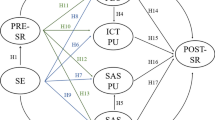Abstract
This multicase study investigated the learning experiences of four college students identified respectively as internal and external locus of control. They were taking a basic educational technology course that supplemented classroom teaching with two course web sites. Four categories that characterized their learning experiences suggested some relationship between locus of control and learning experience.
Similar content being viewed by others
References
Angulo, A. J., & Bruce, M. (1999). Student perception of supplemental web-based instruction. Innovative Higher Education, 24, 105–125.
Bransford, J. D., Brown, A. L., & Cocking, R. R. (1999). How people learn: Brain, mind, experience, and school. Washington, DC: National Academy.
Cassidy, S., & Eachus, P. (2000). Learning style, academic belief systems, self-report student proficiency and academic achievement in higher education. Educational Psychology, 20, 307–320.
Daly, J. A., Kreiser, P. O., & Roghaar, L. A. (1994). Question-asking comfort: Explorations of the demography of communication in the eighth grade classroom. Communication Eucation, 43, 27–41.
Daugherty, M., & Funke, B. (1998). University faculty and student perceptions of web-based instruction. Journal of Distance Education, 13, 21–39.
Dollinger, S. J. (2000). Locus of control and incidental learning: An application to college student success. College Student Journal, 34, 537–540.
Gibbs, W. J. (1998). Implementing online learning environments. Journal of Computing in Higher Education, 10, 16–37.
Glaser, B. G., & Strauss, A. L. (1967). The discovery of grounded theory. Chicago, IL: Aldine.
Heines, J. M. (2000). Evaluating the effect of a course web site on student performance. Journal of Computing in Higher Education, 12, 57–83.
Merriam, S. B. (1998). Qualitative research and case study applications in education. San Francisco, CA: Jossey-Bass.
Rotter, J. B. (1966). Generalized expectancies for internal versus external control of reinforcement. Psychological Monographs: General and Applied, 80, 1–28.
Rotter, J. B. (1990). Internal versus external control of reinforcement: A case history of a variable. American Psychologist, 45, 489–493.
Ryan, M. E., Carlton, K. H., & Ali, N. S. (1999). Evaluation of traditional classroom teaching methods versus course delivery via the World Wide Web. Journal of Nursing Education, 38, 272–277.
Wang, A. Y., & Newlin, M. H. (2000). Characteristics of students who enroll and succeed in psychology web-based classes. Journal of Educational Psychology, 92, 137–143.
Additional information
Danhua Wang is Assistant Professor of Reading at St. Louis Community College. She received the Ph.D. from Oakland University. Her particular interests are the learning and reading comprehension processes
Rights and permissions
About this article
Cite this article
Wang, D. Students’ Learning and Locus of Control in Web-Supplemental Instruction. Innov High Educ 30, 67–82 (2005). https://doi.org/10.1007/s10755-005-3299-x
Issue Date:
DOI: https://doi.org/10.1007/s10755-005-3299-x




